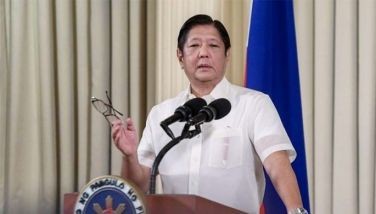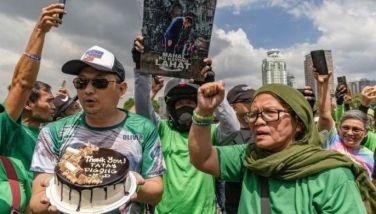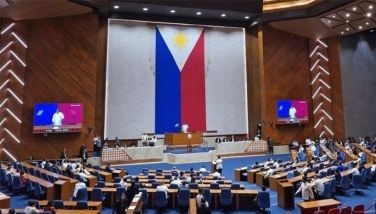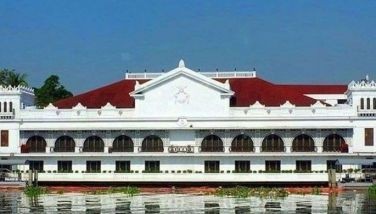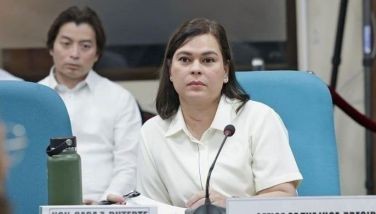PCGG to revive cases vs JDV, Marcos cronies
April 11, 2002 | 12:00am
The Presidential Commission on Good Government (PCGG) will revive criminal and civil cases against Speaker Jose de Venecia and several other Marcos cronies who allegedly failed to live up to their end of compromise agreements with the government.
PCGG Commissioner Victoria Avena said yesterday the supposed cases against De Venecia are among 33 compromise settlements that the agency reviewed recently.
Avena said the cases against De Venecia stem from assets he supposedly acquired from Land Oil Corp., which De Venecia and his brother Oscar used to head.
Avena cited the case filed against De Venecia before the Sandiganbayan that was settled on the condition that De Venecia surrender to the government certain properties in New York.
But De Venecia’s spokesman Noel Albano said De Venecia had already been cleared "separately and with finality" of all the charges by no less than the Ombudsman, the Sandiganbayan, three PCGG panels and even the Supreme Court.
Moreover, Albano said it was not De Venecia who entered into a compromise agreement with the government but Land Oil.
"It was PCGG and Land Oil that entered into a compromise agreement after the PCGG declared that Land Oil was not a crony company but a victim of Marcos cronies," Albano said.
He explained that the compromise agreement was forged in 1998 since De Venecia had resigned as Land Oil chairman in 1985, or one year before Marcos was ousted from office.
Albano said the government still has chance of collecting from Land Oil because several collection cases amounting to $75 million and other claims of more than $100 million are still pending with the United Nations Compensation Commission.
The cases were filed by US law firm Baker McKenzie and the Department of Foreign Affairs and the proceeds are supposed to be turned over to the government.
But Avena said that in several other cases, Marcos cronies have failed to turn over to the government assets they promised to surrender in exchange for criminal immunity.
"The government should have benefited from these agreement but it did not happen," Avena said.
She said the PCGG would likely revive the cases against Roberto Benedicto, Jose Y. Campos, Anos Fonacier, Rodolfo Cuenca, Alejo Ganut, Roberto Abling and Maximiano Argana.
"The government has given them immunity from suits so they must also do their share. There is no price for permanent peace of mind," Avena added.
PCGG Commissioner Victoria Avena said yesterday the supposed cases against De Venecia are among 33 compromise settlements that the agency reviewed recently.
Avena said the cases against De Venecia stem from assets he supposedly acquired from Land Oil Corp., which De Venecia and his brother Oscar used to head.
Avena cited the case filed against De Venecia before the Sandiganbayan that was settled on the condition that De Venecia surrender to the government certain properties in New York.
But De Venecia’s spokesman Noel Albano said De Venecia had already been cleared "separately and with finality" of all the charges by no less than the Ombudsman, the Sandiganbayan, three PCGG panels and even the Supreme Court.
Moreover, Albano said it was not De Venecia who entered into a compromise agreement with the government but Land Oil.
"It was PCGG and Land Oil that entered into a compromise agreement after the PCGG declared that Land Oil was not a crony company but a victim of Marcos cronies," Albano said.
He explained that the compromise agreement was forged in 1998 since De Venecia had resigned as Land Oil chairman in 1985, or one year before Marcos was ousted from office.
Albano said the government still has chance of collecting from Land Oil because several collection cases amounting to $75 million and other claims of more than $100 million are still pending with the United Nations Compensation Commission.
The cases were filed by US law firm Baker McKenzie and the Department of Foreign Affairs and the proceeds are supposed to be turned over to the government.
But Avena said that in several other cases, Marcos cronies have failed to turn over to the government assets they promised to surrender in exchange for criminal immunity.
"The government should have benefited from these agreement but it did not happen," Avena said.
She said the PCGG would likely revive the cases against Roberto Benedicto, Jose Y. Campos, Anos Fonacier, Rodolfo Cuenca, Alejo Ganut, Roberto Abling and Maximiano Argana.
"The government has given them immunity from suits so they must also do their share. There is no price for permanent peace of mind," Avena added.
BrandSpace Articles
<
>
- Latest
- Trending
Trending
Latest
Trending
Latest
Recommended



















